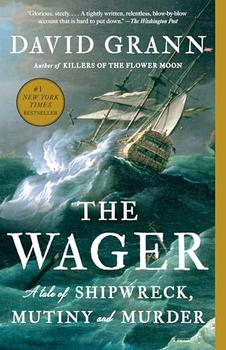Write your own review!
Mary Jane D. (Arlington Heights, IL)
True Swashbuckling Tale
The Wager is a very well researched and well written story of a little known historical event. The documented events on the HMS Wager were the inspiration for some famous writers but David Grann tells us the entire story of an 18th century maritime disaster. He makes this nonfiction account very readable and in fact come alive. The characters are well developed with much initial background about them. I felt the beginning was a little slow but then realized we needed the details to understand their actions.
This book would appeal to readers interested in British maritime history or those who like a good swashbuckling true tale of the sea.
Brenda D'
The Wager
An unbelievable story, but true, of hardship, fortitude, betrayal, human folly, and survival. It's also a look at the pervasiveness of England's 18th century societal class structure, its government, and its imperialistic ambitions.
Author makes even 18th century maritime history interesting in this well-researched, well written, and easily readable book. It is a fascinating look at the complex world of maritime life, customs, and procedures. Particularly effective is the way he builds the characters in the beginning so you can follow them throughout the suspenseful story.
If you enjoy non-fiction, this one is a must read. I would give it a 4.5 rating.
Anne G. (Austin, TX)
The Wager by David Grann
If David Grann's name isn't enough to draw you to this book perhaps the subtitle will push you to give this one a try.
The 1740 ill-fated sailing of the Wager on a challenging mission was compounded by a rickety vessel, a mutinous crew, raging illnesses, and an abundance of bad weather. Sent out to wage war against Spain they barely even encountered the Spanish warships before their plans were changed and disaster engulfed them.
This book is a well researched and well written narrative nonfiction. There is a lot of detail about the events with a lot of action to propel the reader from one dire crisis to the next. We can now add the Wager to the collection of naval disasters like Shackelton's exploration, the sinking of the Lusitania, and the Halifax explosion.
Sherry K. (Lufkin, TX)
The Wager
This novel is not an easy read. Not twisty, not romantic, not swashbuckling nor any of the reasons we usually expect or desire in our book selections. It is difficult to read. So many people with so many stories in a time in history when countries are trying to assert themselves to profit from the newly discovered lands, people, crops, and precious metals. Which country or king will take control of these newly found treasures?
The period is the latter part of 1600 to the mid 1700's. The Wager is a small ship in a squadron of five ships sailing from Portsmouth, England, to wage a secret war on a Spanish galleon near Brazil for gold onboard these Spanish ships.
There were many literate men who could read and write aboard the squadron ships. They kept journals some for themselves and others, officers, as a requirement of their jobs. Remarkably, much information from these sources was intact and usable. The author spent 5-6 years researching and gathering data which had not been lost, destroyed, or damaged making them useless.
It is a challenging read. There are so many characters, so many positions/ranks among the crew, diseases, scurvy, burials overboard, storms and eventually mayhem, murder, mutiny, and cannibalism.
Wanda T. (The Villages, FL)
The Wager
I had never heard of the ship the Wager, an armed trading vessel bought by the Royal Navy in 1739 to help attack and capture Spanish ships. This is an account of the hardships the crew endured when they became marooned on an island after their ship wrecked and the aftermath when the survivors were rescued.
The story kept my interest but there was a lot of technical jargon about the ship that I did not understand. Drawings or pictures would have helped.
This was a sad tale of the many months of bad weather and starvation while trying to survive. Mutiny was inevitable and many men did not survive.
The ending was not what I expected and it left me disappointed that no one was held accountable for all that transpired.
I appreciate all the research done by the author to bring this story to life!
Cathy M. (Redwood City, CA)
A run-of-the-mill seafaring tale devoid of moral or lesson
The Wager was fairly well-written and saved me from reading the several contemporaneous books written by the participants. I feared they would be wordy in the extreme just judging by their paragraph-length titles. Mr. Grann seems to have condensed their accounts into one book in which he tries to be fair to all sides. Briefly, an ill conceived plan to pirate gold from Spanish ships leaving Chile gets half-hearted government support; hastily refurbished ships; impressed and untrained crew carrying lice. Many die of typhus leaving the Wager ill prepared for the hardship of rounding cape horn. The newly appointed and vainglorious captain pushes on grounding the ship and marooning the surviving crew on an inhospitable island that is little more than a rock. Many die but a surprising number make their way back to England where the recriminations start. The book was an interesting and I assume accurate recounting of a pointless naval excursion that few of the original crew survived. Without a unifying theme or point of view I can only say, oh well.
